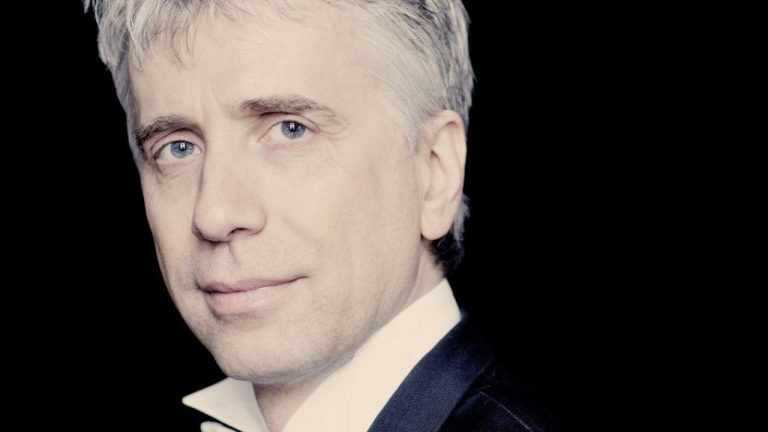Grzegorz Chojnowski (Radio Wrocław Kultura) talks with Giovanni Antonini, Artistic Director of the International Festival Wratislavia Cantans.
– When you look at your years with Wratislavia Cantans, what comes to your mind?
– I learned a lot during this time. I hope that I have lived up to the task of Artistic Director. I have served the festival well, although I often feel uncertain. It is a challenge and a great opportunity to explore various themes and threads in music, I would probably not have such an opportunity if it weren’t for the festival. Especially as Wratislavia Cantans does not focus only on Baroque or early Classical music, which is what I specialise in, all eras are important here.
– Wratislavia always has a meaningful title, referring to the purely musical world (like “Ricercar cantando”) or related to social and cultural contexts. Therefore, the music that sounds at the festival is music in which reality and history are reflected. Last year, the year the war broke out, the theme was “Dangerous Liaisons”.
– Perhaps twenty years ago the title was not as important as it is now, when we are building a festival around a certain topic, a topic that more effectively engages the audience’s interest. For me, the title is a starting point for discovering connections, creating new ones, tighter or looser. I usually start planning the programme with one concert, my idea or someone’s proposal, which is particularly interesting for me. And then I ask the artists and suggest what might fit the theme. Sometimes I use literary cues (as in the case of Dangerous Liaisons), but it’s always about keeping the mind working, inspired. And it’s about stimulating and intriguing listeners.
– So why is the title of this year’s edition “Mother Nature”? Does it also stem from the desire for hope that can be carried through music? As nature is always in action, it creates and recreates with imminent power.
– In our time, we think and talk a lot about the relationship between humanity and nature. It’s a big deal. We have been warned for years, and now we are shocked by hurricanes, floods, climate disasters that are already happening in Europe. No one should be surprised when the attitude of humans to nature, to animals is so selfish, sick. Through music we can, being aware of limitations, do something, change our thinking. Let’s have a look at Beethoven’s Pastoral Symphony, featured in the first concert of the festival, how it romanticism nature. My starting point this time was Haydn’s oratorio The Seasons, a work I’ve always wanted to do, a work rarely presented. I don’t want to teach anyone anything through music, but thanks to it, I want to remind you once again what the situation is, about our inextricable relationship with nature.
– For Haydn the composer, this oratorio became an opportunity to musically touch folk motifs, but perhaps even more important is the message in such works. Very humanistic: only a virtuous person can achieve the state of eternal happiness. In Haydn’s time, the sins of civilization were equally hard to overlook. Maybe not equally, because now we have issues of the climate that we are destroying, next to the wars and social inequalities that were also taking place in Haydn’s time.
– Indeed, The Seasons was written before the industrial revolution, it was a different world, although back then there were also problems with environmental pollution, with hygiene in cities, with diseases. There is also a religious theme in Haydn’s work. Nature as a gift from God and the relationship of humans with God. Haydn’s music is often progressive, but let’s not forget that he was a composer of the 18th century, part of that order and system that was shaken by the Napoleonic wars. It is hard to call Haydn a revolutionary. As a composer, he faced the difficult task of expressing nature, rivers and snow musically. And I think at the end of the day he felt happy that he succeeded. Human presence was also important to him. How lost humans are in nature, especially in winter, how they look for salvation and find it in other humans, in a community that joins together to be able to survive objective difficulties, climate conditions. Haydn shows and celebrates the existence of social solidarity, at the level of the empire in which he lived, and at the level of the family. Human ties are the way to survive today as well.
– Did you choose Haydn’s oratorio for your concert this year also as a kind of counterpoint or a break in the preparation of the complete recordings of his symphonies, a project planned for the anniversary year 2032? Aren’t you a little bored with the symphonic Haydn?
– Absolutely not. We already have more than half of this journey behind us. Even the lesser-known symphonies have something in them that intrigues us. When I start working on a particular piece, I sometimes think that this time it won’t be too interesting, then after a while I completely change my mind. It’s unexpected and fascinating. The beauty of music is not immediately apparent in Haydn, unlike in Mozart. In Haydn’s music beauty is hidden, and as we know, what is hidden can be even more interesting. I do not feel bored, I am aware of the challenges of this project, it requires a lot of energy and time, but it brings satisfaction.
– I asked a provocative question, and you will admit that The Seasons is a work of astonishing diversity.
– When we play fragments of this work with musicians, we realize that we already hear Romantic notes, resembling Schubert, and even the music of the 20th century. At times I have the impression that we are performing Eric Satie’s compositions, with their characteristic humour and repetitions. It’s an exciting discovery while working on Haydn, these connections with the music created before him, with Vivaldi, Pergolesi, and a harbinger of the music of the future. This is something worth further research.
– It’s a bit like with the programme of the entire festival: we have Beethoven and Haydn, we also have the Accademia del Piacere concert with early Spanish music, which we do not know here, as well as songs by Estonian composers with the choir of the Estonian Philharmonic. Musica Boscareccia will be the first contemporary ensemble to perform Ave Regina by Francisco Corselli. This is also an important goal of the festival: to present the unknown.
– Of course. The festival should be characterised by repertoire diversity and the emergence of new artists with new ideas and works. Wratislavia offers a lot of opportunities, maybe even more than a normal philharmonic season. I also noticed that in September the audience is more open to discovery, to connect to something less known or unknown. Maybe more relaxed after the charms of summer?
– This year we will hear pieces by Antonio Vivaldi, one of your favorite composers, but it will not be The Four Seasons …
– Phew… [smiles]. Last year we proposed the oratorio Rappresentatione di anima, et di corpo by Emilio de’ Cavalieri with the participation of the NFM Boys’ Choir, now we have the opportunity to present, together with the soloists conducted by Enrico Onofri, the NFM Girls’ Choir, founded not so long ago. The idea is to perform Vivaldi’s sacred music, Gloria and Magnificat, as intended by the composer himself. Vivaldi was for many years a teacher at the Ospedale della Pietà orphanage in Venice, where he led a girls’ choir. So his works were performed by girls, replacing male voices, singing an octave higher. It’s a completely different sound that we’re not used to, but that’s what Vivaldi wanted. His choral works were performed also outside the school with a normal set of voices, and we will present the version he probably heard for the first time after writing a composition for the orphans of the Ospedale della Pietà. This will happen thanks to the establishment of a new, excellent female choir in Wrocław, which has made us think about such a concert, closely related to the programme of the entire festival.
– Especially as mother nature is a woman at different times in her life. And the concert of the Arte dei Suonatori ensemble is an opportunity to ask you about Telemann. You know this work well, you released an album with his works with Il Giardino Armonico, you have also played, among others, the Flute Concerto in E minor. Telemann is the most prolific composer of all time, and at the same time much less known and played than Bach and other old masters. Why?
– I love Telemann. On the one hand, he knew how to write easy music for dilettantes, and on the other such masterpieces as the Brockes-Passion (we presented this sophisticated work at Wratislavia in 2017, in the Church of Mary Magdalene). So we will find all types of works in his oeuvre. During his lifetime, Bach was perceived more as a performer than a composer of great music, he had problems, while Telemann was successful, famous and popular, hence the myth about the superficiality of his output. This approach dates back to the Romantic era, when Bach began to be the great Bach, while Telemann was disregarded. Wrong! Even Telemann’s easier compositions are always brilliantly written, not to mention numerous masterpieces. Thus, an unfair opinion about his music was formed by nineteenth-century musicologists who pointed to Bach as the model of German genius. When nationalist sentiments grew, they needed the figure of a champion, due to Germans’ inferiority complex towards the culture of Italy or France. Telemann suffered from the comparison with Bach, and it is unwise to compare them to each other, they were different composers. But let’s not forget about their friendship: Telemann became the godfather of Carl Philipp Emanuel, the second of Bach’s sons. Unfortunately, people tend to repeat historical judgments, but today is the time for a mature, different, informed approach. And for more concerts with the music of Georg Philipp Telemann, also at Wratislavia Cantans.
– The programme of the final concert of the festival includes works by Rebel (a lesser-known composer) and Bach (number one in almost all composition rankings). Another interesting connection. Of Bach’s works, we will hear the cantata Schleicht, spielende Wellen, whose protagonists are four European rivers, including the Vistula “singing” in bass (the Elbe is a tenor, the Danube is an alto, the Pleisse is a soprano). The performance of this work seems to me particularly significant at a time when we are talking so much in Poland, in Lower Silesia, about the well-being of rivers, after the initiative to grant legal personality to the Oder was launched. So we return to the issue of the importance of music in today’s world as one of the elements, elements of this world. How important is this role in your opinion?
– Good question. Before I answer, I want to emphasize that Schleicht, spielende Wellen was called “dramma per musica” by Bach himself. It’s more than a cantata, actually it’s an opera. In the context you mentioned, this work may now sound not only as a metaphorical vision of the Baroque composer, but also as a reflection and argument in the current debate. You are asking about the importance of music. It has certainly survived all the catastrophes, wars, political systems, we still meet to create, play and listen to music. This survival is the message, the miracle. Music plays an even more important role than literature. How many people today read Goethe, and how many listen to Mozart, Haydn, and Bach? In this sense, music matters to people. At the same time, it must be remembered that the best music is not easy to listen to, it requires attention and dedication, which can be a problem especially in the era of dizzying pace of life. But I think that if music has survived to our times, it will also survive these times.










